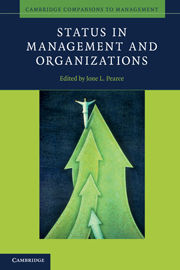Book contents
- Frontmatter
- Contents
- Figures
- Tables
- Contributors
- Foreword
- Preface
- 1 Introduction: The power of status
- Part I How status differences are legitimated
- Part II The influence of status on markets
- Part III The role of status in new industries and ventures
- Part IV When ascriptive status trumps achieved status in teams
- Part V Status in the workplace
- 10 Organizational justice and status
- 11 Resolving conflicts between status and distinctiveness in individual identity
- Part VI Developing status and management knowledge
- Index
- References
10 - Organizational justice and status
Theoretical perspectives and promising directions
from Part V - Status in the workplace
Published online by Cambridge University Press: 05 June 2012
- Frontmatter
- Contents
- Figures
- Tables
- Contributors
- Foreword
- Preface
- 1 Introduction: The power of status
- Part I How status differences are legitimated
- Part II The influence of status on markets
- Part III The role of status in new industries and ventures
- Part IV When ascriptive status trumps achieved status in teams
- Part V Status in the workplace
- 10 Organizational justice and status
- 11 Resolving conflicts between status and distinctiveness in individual identity
- Part VI Developing status and management knowledge
- Index
- References
Summary
I really bust my butt now that I’m District Manager. I’m doing the same stuff that I did as Assistant District Manager – but that title, you know, I gotta work harder now that people look up to me.
District manager of a retail chainIf she were another manager around here, I would have asked her about the hours she wanted. But Trish is only a waitress, so I just scheduled her however I wanted. There’s nothing wrong with that.
Restaurant managerI explained the problem thoroughly and respectfully to my General Manager but not the technicians. There’s no reason to involve any of the techs in making decisions. It’s okay just to tell them what to do.
Service manager at auto dealershipThe above comments, culled from the senior author’s notes from workplace interviews over the years, suggest that managers are implicitly aware of a connection between justice and status. The district manager suggested that he was attuned to distributive justice when expressing the need to be deserving of his prestigious title. The restaurant manager did not think she was violating procedural justice by failing to give voice in the scheduling process to a lower status person, although she would have given voice to a higher status person. Finally, the service manager was sensitive to satisfying interactional justice by explaining outcomes to his superiors but not to his subordinates.
Not surprisingly, scholars are also familiar with connections between justice (or fairness) perceptions and status. This is particularly evident among sociologists (e.g., McClendon, 1976), who have studied how positions in occupational status hierarchies dictate the shares of rewards to which individuals feel fairly entitled, and psychologists (e.g., Van Prooijen, Van den Bos, and Wilke, 2002), who have examined how people’s thoughts about status led them to be concerned with following fair procedures. Despite such disciplinary links – and in keeping with the general observation that “status occupies a rather minor place in the … organizational behavior literature” (Pearce, Ramirez, and Branyiczki, 2001, p. 155) – connections between justice and status noted in the literature are not fully developed. However, scattered studies suggest that justice and status are interrelated in complex ways. Based on the belief that there is much to be learned about both justice and status by developing a rapprochement between them, we review their interrelationship in the present chapter. To this end, we juxtapose the various theoretical perspectives that shed light on the psychological processes underlying these connections and we also examine several of the most promising research directions stemming from them.
- Type
- Chapter
- Information
- Status in Management and Organizations , pp. 269 - 303Publisher: Cambridge University PressPrint publication year: 2010

